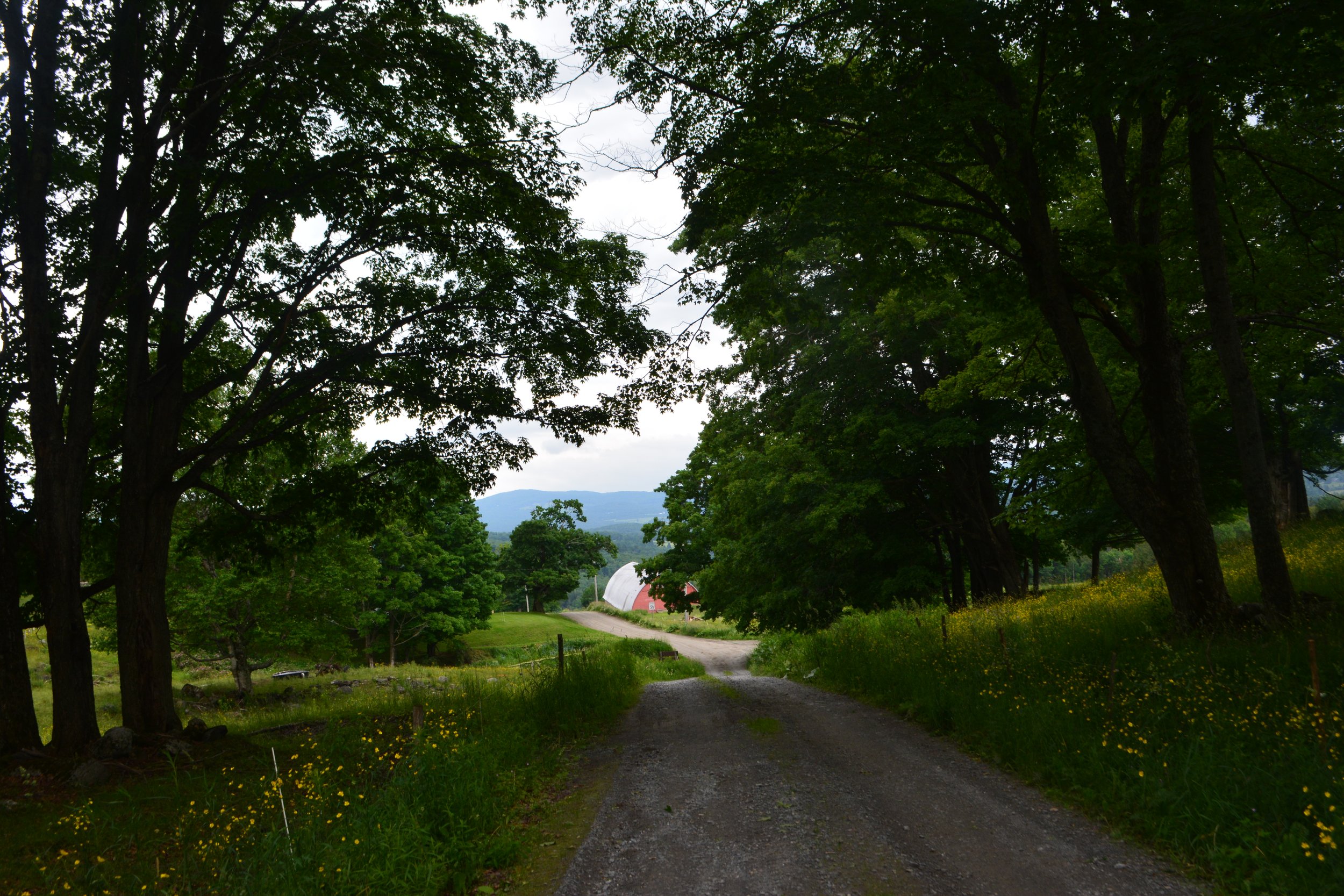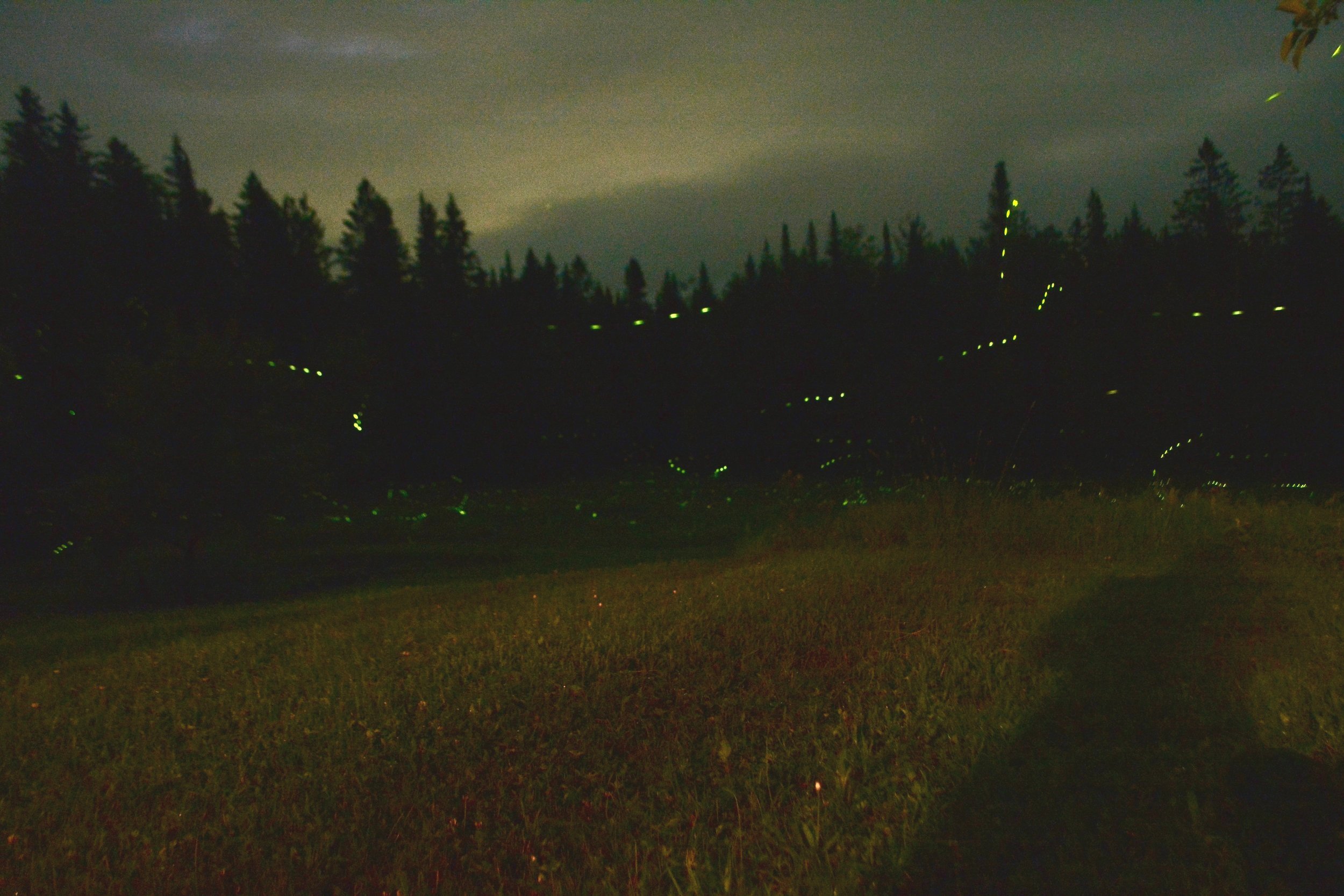I.
Behind the house in Vermont, there’s a grassy hill that drops into a meadow of wild plants. At night, I stand at the edge of that hill and watch hundreds of fireflies in the meadow below. They pulse in a structured dance of bioluminescence, green points disappearing and reappearing in short, hypnotic bursts.
The air is cool, and the wind comes gently through the trees. The moon is bright enough to provide a sense of safety at night. I can see the blades of grass by my feet. I am a strange observer in a strange land, watching a performance meant for nobody in particular.
fireflies
II.
The dawn dew falls heavy over the green hills. I tie my shoes, check my watch, and begin to jog up a dirt road. The soil underfoot is firm, yielding only slightly under the weight of my pounding steps. The slope is steep, then briefly becomes level, before beginning a sinuous descent.
I pass red barns and farmhouses. Cows look on with idle curiosity. The pastures are spattered with wildflowers. Salty droplets of sweat trickle down my forehead. Occasionally, I come across dilapidated structures that seem to be melting into the earth.
Miles slip by. The sun rises, although I hardly notice. The sky is not a riot of color; it is an atmosphere burnt grey with smoke. The smoke is from the Canadian wildfires. It comes, regular as rain, every few days this summer.
All we can do is wait.
hillside
III.
The ancient Greeks had a word, akrasia, to describe the peculiar human condition of acting against our better judgment. It's the mid-afternoon snack when we're trying to diet, or procrastination when a deadline looms. It is a failure of will that creates a disconnect between knowledge and action—a hiatus where, despite knowing the facts, we seem unwilling to act upon them.
In the context of climate change, the consequence of akrasia is not an extra pound on the scale or a late project submission; it's a warmer planet, rising seas, crop failures, and more frequent and intense natural disasters, like wildfires.
wildfire smoke over lake champlain
IV.
The Jevons Paradox suggests that as technological progress increases the efficiency with which a resource is used, total consumption of that resource may increase, rather than decrease. For instance, as energy-efficient technologies (i.e., LED light bulbs, electric vehicles, etc.) become more prevalent, reductions in cost and increases in availability lead to greater overall consumption, even as efficiency improves.
The Jevons Paradox, when considered alongside akrasia, creates a complex landscape for climate action. On the one hand, we are aware of the need to reduce greenhouse gas emissions. On the other hand, our actions—both as individuals and as a collective—do not align with this knowledge, either due to inaction or because action backfires.
V.
The ancient Greeks also had a term, metis, to describe a type of wisdom and cunning that acknowledges the complexity and unpredictability of the world. Metis was linked to the goddess Athena, renowned for her intelligence and strategic abilities. It can be interpreted as using creativity, flexibility, resourcefulness, and a profound understanding of human nature to navigate uncertainty and make sound decisions despite incomplete information.
To have metis, we must have a clear recognition of the world.
In having metis, we equip ourselves to mitigate risks endemic to our rapidly changing world.
rain, and off in the distance, middle-left of picture, wind turbines
VI.
A heavy downpour drives away the smoke. I’m stuck inside, at the mercy of a different natural force.
I’m thinking about how our physical relationship with nature influences our behavior, which is to say, I’m thinking about the importance of being connected with nature.
When we are disconnected from nature, it’s easy to give in to the belief that humans can always shape the planet to fit our desires, because most of what we interact with has been shaped by humans to fit our desires. This breeds hubris.
New technologies made possible by science, finance, and regulatory support are required to combat climate change. But, if we are not careful, we may treat the application of these technologies with the same hubris that results from being cut off from nature, hubris that manifests in a drive to demystify nature, to sever ourselves from it, and consequently, to cut down forests and dam up rivers in the name of progress.
Continuing down this path creates a heavier burden over time as we continue to experience a gap between our knowledge and action (akrasia), and, as a result of elevating ourselves above nature (demystification), have nobody to blame but ourselves.
We must understand that mere awareness is insufficient and that effective action results from coupling awareness with policies and systems that make sustainable choices easier and more attractive, thereby facilitating the alignment of knowledge and behavior.
Given the Jevons Paradox, efficiency improvements must be part of a broader strategy that includes the development of a variety of hard climate technologies, changes in consumption and production, robust policy measures to mitigate unintended increases in consumption, and a certain amount of slack built into the system.
By viewing nature, ourselves, and the technologies we develop as a living, dynamic system, rather than resources or tools to control, we become less detached. We strike a balance between striving for knowledge and accepting the limits of our understanding (metis).
We sensibly re-mystify.
We lighten our burden.
hiking on a clear day
VII.
I came to Vermont this summer to reconnect with nature, and it feels like it’s happening. I hike in thick woods, run along rolling dirt roads, and swim in lakes clear and cold. Even the wildfire smoke seems to draw me back into nature. It whispers that I’m a small part of a large system.
It's necessary, this whispering, though rain can do the same, and rain I prefer to smoke.
Last night, the sound of hard summer rain on an old wooden roof woke me before lulling me back to sleep.
Rain, like smoke, insists: recognize your place in the world.
But rain also whispers: safety. It hums: sleep.
evening, after rain






